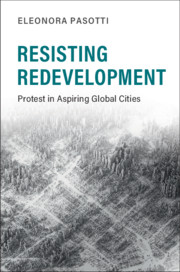Book contents
- Resisting Redevelopment
- Cambridge Studies in Contentious Politics
- Resisting Redevelopment
- Copyright page
- Dedication
- Contents
- Illustrations
- Acknowledgments
- Part I Setting the Comparison
- 1 Introduction
- 2 Explaining Protest against Urban Redevelopment
- 3 Research Design and Overview of Results
- 4 Aspiring Global Cities
- Part II Explaining Mobilization
- Part III Explaining Impact
- Book part
- Bibliography
- Index
- Cambridge Studies in Contentious Politics
4 - Aspiring Global Cities
from Part I - Setting the Comparison
Published online by Cambridge University Press: 09 March 2020
- Resisting Redevelopment
- Cambridge Studies in Contentious Politics
- Resisting Redevelopment
- Copyright page
- Dedication
- Contents
- Illustrations
- Acknowledgments
- Part I Setting the Comparison
- 1 Introduction
- 2 Explaining Protest against Urban Redevelopment
- 3 Research Design and Overview of Results
- 4 Aspiring Global Cities
- Part II Explaining Mobilization
- Part III Explaining Impact
- Book part
- Bibliography
- Index
- Cambridge Studies in Contentious Politics
Summary
Chapter 4 provides background on the ten aspiring global cities and their theoretical and empirical comparability. Despite important variations, the cities examined share these core features: (1) They are key national and regional nodes of business and politics. (2) They experienced major and controversial redevelopment, which has caused different forms of displacement. (3) They have intensified the use of branding and cultural policies as engine of economic growth, often thereby promoting the “creative class.” The chapter presents data showing their shared prominence and discusses the high degree of institutional variation between the cities.There is significant variation in how markets and governments combine to pursue international competitiveness policies and the associated urban redevelopment. In developmental states, an essential feature is the elimination of informal settlements, with the consequent massive and brutal displacement of the poor, as examined in Seoul, Istanbul, Buenos Aires, and Santiago. In more advanced economies, a key dynamic is the erosion of public-sector housing, as illustrated for Hamburg. Redevelopment policies weresupported by city branding and legitimized by connections to cultural industries as new engines for economic growth, as examined in Tel Aviv, Seoul, Buenos Aires, and Los Angeles.
Keywords
Information
- Type
- Chapter
- Information
- Resisting RedevelopmentProtest in Aspiring Global Cities, pp. 76 - 98Publisher: Cambridge University PressPrint publication year: 2020
